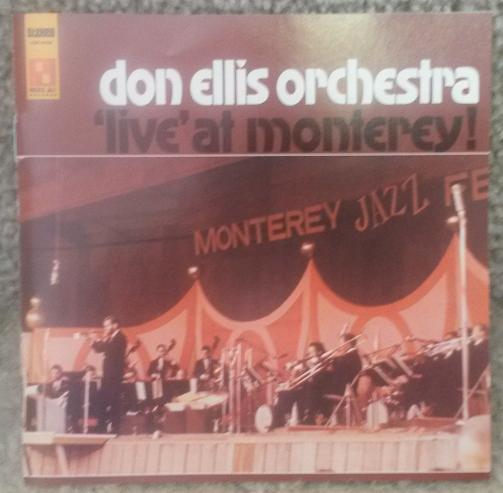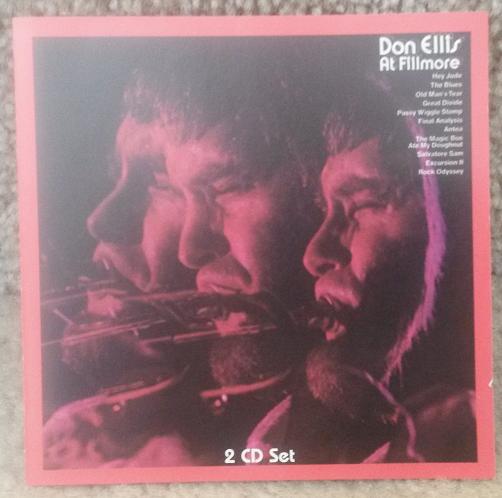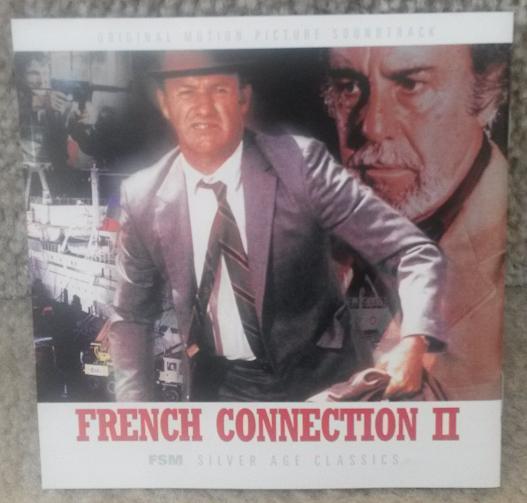
Don Ellis
Composer, Bandleader, Educator, Trumpet Player, Drummer
1934-1978
Don Ellis became interested in jazz through the music of trombonist Tommy Dorsey.
However, listening to Don's trumpet playing reveals a big influence from Dizzy Gillespie.
He received a degree in composition and then played in the bands of
Glenn Miller, Charlie Barnet, and Maynard Ferguson,
but his composer's mind was drawn to the avant-garde work of George Russell.
His world travels and interactions with international artists led to two of his best-known interests:
(1) microtonality and (2) unusual time signatures.
1. The former is a reference to intervals smaller than a half step, in other words,
notes closer together in pitch than neighboring notes on a piano keyboard.
2. The latter means using rythmic patterns other than the "normal" three, four, or six beats.
He composed in meters of
5/4,
7/8,
11/8, and beyond.
Even 27/16 and
33/16!
Recordings by this innovator are too numerous to mention here.
This is a sampling from my personal collection.
1960-1962
Here is a collection of some of his early recordings.You can see that most of it is his take on other composer's works,
but you also see that he was introducing his original material.

1961
This recording is by the Don Ellis Quintet.His trumpet is backed by vibes, piano, bass, and drums.
This consists completely of his own compositions.
One of the tracks is the result of Ellis playing entirely by himself,
after entering the studio with no preconceived notion of what he would improvise.

1966
This is from the well-known and influentional Monterey Jazz Festival.Don't know why the word "live" is in quotes in this album title.
This 20-piece big band, which he billed as an orchestra, really was LIVE!
In fact, noted jazz chronicler Leonard Feather said,
"His band opened the matinee here Sunday and stopped the show."

1967
Here's a recording from two more live concerts.The album title comes from a time signature he called "three and two-thirds four."
It's really 11/8. Think 12/8, counted in four, with one third of the last beat missing!
ONE-and-uh Two-and-uh Three-and-uh Four-and
ONE-and-uh Two-and-uh Three-and-uh Four-and

1969
The "New Don Ellis Band," rather than the "Orchestra," went underground?Two things make this recording distinct.
1. It includes covers of songs by pop artists of the day, e.g.
Blood Sweat & Tears, Nilsson, Sly & The Family Stone, 3 Dog Night, and The Isley Brothers.
2. It features a vocalist, Patti Allen, on a few of the tunes.

1970
Concert promoter Bill Graham owned the famous Fillmore West venue.It hosted many famous rock-n-roll artists in the late 1960s and early 1970s.
The performance there by the Don Ellis Orchestra included his version of "Hey Jude."
In his own words, "I don't know if the Beatles will recognize their tune . . ."
Various electronic effects, usually associated with rock guitar, were used on his trumpet.

1971
I agree with the many critics who regard this as the pinnacle of Don Ellis' work.One of the crowning achievements from Ellis' perpective was the inclusion of his new pianist.
He was Milcho Leviev, the Bulgarian composer whom they brought from behind the Iron Curtain.
Leviev is featured most notably on the cuts "Blues In Elf" and "Bulgarian Bulge."
The album's finale (i.e. next-to-last number) is masterpiece "Strawberry Soup."
It includes layering of time signatures as well as group improvisations!

1971
Ellis won a Grammy for his score for the film "The French Connection."The movie won the Oscar for Best Picture, so naturally they made a sequel.
And naturally, they invited back the original film's composer!


1977
Ellis capitalized on the success of the movie "Star Wars" and its theme music.In addition to arrangements of John Williams' main title and "Princess Leia,"
he supplied eight original sci-fi compositions from "Other Galaxies And Planets."

~ FURTHER READING ~
Don Ellis' death came too soon.
He was known to seriously challenge his band members.
He seemed to push himself as hard as he pushed anyone.
He began having heart problems: ironically, it beat in unusual rhythms!
His fatal heart attack came at age 44.
(Well, he beat Mozart by nearly a decade.)